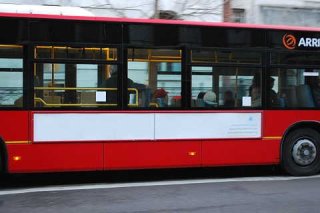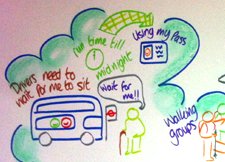According to a report in the paper, free bus passes may end. This would be a disaster for some people I regularly meet on the bus which they rely on, not just for transport but as a social lifeline. They talk to each other. Some people have no-one else to talk to all day – all week.
Fares are not cheap which is no problem for those of us who can afford it but it adds a lot to the price of food. If fewer trips are made to the shops to save on fares, this entails much heavier loads – which even trolleys canot carry. Also heavy trolleys are difficult to heave on and off buses.
Until recently, the bus ran every hour and I enjoyed being able to choose a time that suited and return when I wanted. Now I have to catch a bus at 11.00am and wait until 1.35pm until I can return. This can be a very long time to wait. I don’t always want a coffee or to go to the library but this is what I have to do to fill in time – again this all adds to cost. If I miss the bus, the next one is at 4.50pm and dark in the winter.
 The reason for the changes is an amalgamation of several routes to and from Coventry via outlying places in order to make savings. Perhaps we should feel lucky that we have a bus at all. People are getting older and less mobile but are not in less need of transport, food and some sort of social life. If a chat on the bus is the highlight of the day, it seems very little to ask.
The reason for the changes is an amalgamation of several routes to and from Coventry via outlying places in order to make savings. Perhaps we should feel lucky that we have a bus at all. People are getting older and less mobile but are not in less need of transport, food and some sort of social life. If a chat on the bus is the highlight of the day, it seems very little to ask.
Postscript:
I think a talk I had with a man (on the bus, of course!) who came from an outlying village, might be of interest. His bus service had been cancelled and the route joined onto that for my service. This made it a much longer journey for him; the number of buses were decreased and the time in between buses extended.
He said he loved to come into town on a Wednesday as this was Market Day and he could visit the excellent plant stalls for his garden. (I saw him later with several little plants). He was really worried about any possibility of losing the bus service and his bus pass and said that his village had no other connection.
He then said “Getting old is a punishable offence!” How true.



Yes, the bus rationalisation in Coventry causes all sorts of problems. I used to have an hourly service from near my home to and from University Hospital. It was really manageable, because even if you just missed one homeward bound it was really no trouble to wait for the next. Now they’re much less frequent, and you can’t rely on being away from your appointment at a suitable time to catch one. So it’s car again, and congestion and parking charges.
LikeLike
They tell us to give up our cars, to reduce greenhouse gasses, be environmentally friendly; then they cut bus routes and increase waiting times, making mass transit rather inconvenient, especially for the elderly! How does this make sense? 😦
LikeLike
Hello,
I’m staying with my mum in rural Northern Ireland for a few days. She doesn’t drive and uses the local bus which goes to Kilkeel most days.
This bus runs 4 times a day. It also allows her to attend hospital appointments with connect buses to Newry and Belfast.
She also finds that some of the times have been changed so that she has to spend longer waiting on some services.
The bus allows many older people in the community to remain independent and yes, it does have a social function too.
Thank you for your post and for highlighting this important issue.
LikeLike
this is fantastic – very excited to see your mums thoughts – Wondering – did you listen to the ‘Leap’ challenge run by pm on Radio 4 last week – with the story of Geoffrey’s trip on the bus. Highlighting for him the function that the bus played in taking back control of a small element of his life – I was quite overwhelmed by the story when I listened to it for the first time. http://www.bbc.co.uk/news/uk-wales-17233500
Gill’s mum – if you are reading these comments – you are inspiring. Will have to gear up my blog output now! Thanks.
LikeLike
Thank you Gill’s mum for highlighting the important issue of the benefits of free travel for older people. You are absolutely right that a chat on the bus seems very little to ask. I’m looking forward to reading more of your thoughts.
LikeLike
Some really important points and good examples here – it just shows what an emotive subject transport is. If “very little to ask” were the benchmark of community and other support services, it would often be a better world I think. Thank you everyone for responding – both on the blogpost itself and a fantastically encouraging retweeting frenzy on Twitter. And this is just Day One, so we are hoping for further comments!
Mum is overwhelmed and genuinely encouraged, I think, to have another go. She is an avid reader and used to do creative writing. Now we need to make the “leap” from writing letters to the paper – Mum CAN see the point…. to blogging …hmm, still not sure… 🙂 Perhaps I should have linked the “blog challenge” to Leap Day, as demonstrated by the fantastic effort by Geoffrey in Vic’s story.
Meanwhile, I am looking for more “in my shoes” stories to post on the blog please…
LikeLike
Indeed Gill’s Mum – is is so little to ask? My parents rely on the bus service too – in fact without it I wouldn’t have the child care support that I do but that is fraught at times with the last bus now at 5.20 from where I live, instead of 6.20 as it used to be. They have taken buses away again this year so that the choice of where Mom and Dad can go has been lost. Oh they could walk up the long slow hill to catch a different bus but with mum’s angina and dad’s unstable diabetes that’s no great help. The route they took away, served those that lived in the bungalows at the end of the long hill – I wonder what age groups they expected to find living there?
Its a real shame because my mum and dad who chose this bungalow as their final home, not intending to move if at all possible. They didn’t live in the area so from a distance they researched the bus routes and where the buses went. They want to maintain their independence as long as possible. Thank goodness they have become silver surfers so that they can do some shopping online but there’s nothing like going and choosing it yourself!
As for social life – my mum and dad make friends all the time on the bus and as a result now know about local coach trips, WI, U3L, etc, etc. Dad had to give up driving just after they moved and although this has brought challenges the bus has brought them a social life they would never have had. When they care for my daughter during the holidays- the bus is the lifeline to for them to all go out together.
What a shame the bus services don’t realise what a life line they are!
LikeLike
Wholeheartedly agree with the points made by Gill’s Mum and the comments made so far.
This is a serious and somewhat universal problem that we face (as highlighted by the past blog on the Cherwell event that Gill and Philippa Codd ran – https://whoseshoes.wordpress.com/2011/09/06/growing-our-community-following-up-to-make-a-difference/).
Transport is a major issue, critical to our quality of life. For example poor mobility is one of the 5 barriers to older people meeting their nutritional needs, and accessibility is one of the three determinants of food poverty. (for more information – http://www.scotland.gov.uk/Publications/2009/12/07102032/9).
Small things like a bus driver waiting a few extra seconds to let an older person sit down on a bus or services such as subsidised fares – are crucial allowing older people remain part of our community and allowing them to remain in their homes for as long as possible.
In the context of an ageing society it is crucial that subsidised fares are safeguarded and that customer service techniques to make it easier for older people to take transport need to be integrated in systems and training.
LikeLike
Pingback: Dementia friendly? The digital onslaught. In the shoes of… Gill’s Mum :) | Whose Shoes?
Pingback: In the shoes (boots?) of Gill’s Mum’s… daughter! | Whose Shoes?
Pingback: In the shoes (“because I’ve got no boots!”) of … Gill’s Mum | Whose Shoes?
Pingback: “All the lonely people, where do they all come from?” | Whose Shoes?